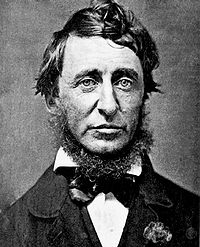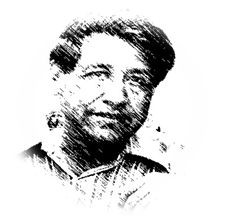
|
||||||||||||||||
Click image for bio
 Henry David Thoreau (July 12, 1817 – May 6, 1862) was an American author, poet, abolitionist, naturalist, tax resister, development critic, surveyor, historian, philosopher, and leading transcendentalist. Best known for his book "Walden", a reflection on simple living in natural surroundings, and his essay, "Civil Disobedience", published in 1849. It is an argument for individual resistance to civil government in moral opposition to an unjust state. This is the first well stated expression of the concept of nonviolent resistance to oppression and injustice.
Henry David Thoreau (July 12, 1817 – May 6, 1862) was an American author, poet, abolitionist, naturalist, tax resister, development critic, surveyor, historian, philosopher, and leading transcendentalist. Best known for his book "Walden", a reflection on simple living in natural surroundings, and his essay, "Civil Disobedience", published in 1849. It is an argument for individual resistance to civil government in moral opposition to an unjust state. This is the first well stated expression of the concept of nonviolent resistance to oppression and injustice.
It is important to understand the meaning and context of Thoreau's work at the time it was written rather than modified interpretations of his views. Civil in this essay refers to matters of society and the state. It does not mean 'in an orderly and polite manner.' Thoreau in this essay is asserting the obligation of the governed to monitor and correct the actions of the state when they are unjust or morally flawed. Thoreau speaks mostly as an anarchist, extremely distrustful of government of any sort. He exhorts the individual to stand on principle and humanity and to take action when the state commits bad acts.
The first paragraph of "Civil Disobedience" clearly demonstrates Thoreau's evaluation of the Government ...
I HEARTILY accept the motto,—“That government is best which governs least;” and I should like to see it acted up to more rapidly and systematically. Carried out, it finally amounts to this, which also I believe,—“That government is best which governs not at all;” and when men are prepared for it, that will be the kind of government which they will have. Government is at best but an expedient; but most governments are usually, and all governments are sometimes, inexpedient. The objections which have been brought against a standing army, and they are many and weighty, and deserve to prevail, may also at last be brought against a standing government. The standing army is only an arm of the standing government. The government itself, which is only the mode which the people have chosen to execute their will, is equally liable to be abused and perverted before the people can act through it. Witness the present Mexican war, the work of comparatively a few individuals using the standing government as their tool; for, in the outset, the people would not have consented to this measure.
This essay was written at a time, 1850s, when slavery was still enfranchised in the United States and the Federal Government was involved in a spurious war with Mexico, seizing territory on weak pretenses.
Links:
- Civil Disobedience
- Civil Disobedience - Thoreau
- Transcendentalism
- On The Duty of Civil Disobedience (by Henry David Thoreau)
